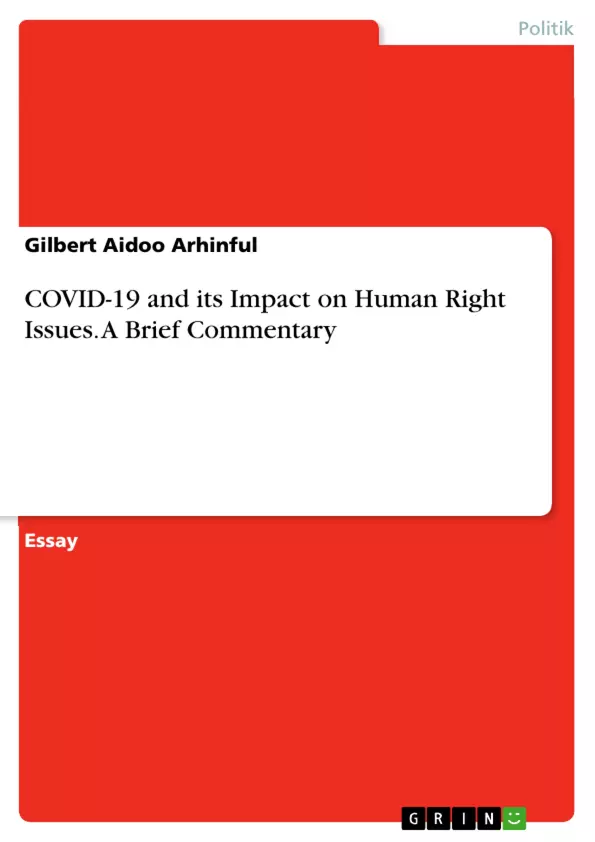This commentary deals with the impact of COVID-19 on human rights issues. As various restrictions and emergency declarations are made following outbreak of novel COVID-19’s pandemic, several human rights issues are also exposed - both on national and international levels. Some people suggest that as states adopts broad measures to address this public health crisis, they tend to violate major basic rights of individuals. The argument is that, while both national and international laws may permit some limited restrictions and state of emergency under specified circumstances, there are excesses found in current approach to the COVID-19 pandemic. To many, these represent global human right crises.
Inhaltsverzeichnis
- COVID-19 und Menschenrechtsfragen: Ein kurzer Kommentar
- Einleitung
- COVID-19: Ein Überblick
- COVID-19 und Menschenrechte
- Die Siracusa-Prinzipien
- Menschenrechte und die COVID-19-Pandemie in Ghana
- Zusammenfassung und Schlussfolgerung
Zielsetzung und Themenschwerpunkte
Dieser Artikel befasst sich mit den Auswirkungen der COVID-19-Pandemie auf die Menschenrechte, insbesondere in Ghana. Der Autor analysiert die Maßnahmen, die von Regierungen weltweit zur Eindämmung der Pandemie ergriffen werden, und untersucht, inwieweit diese Maßnahmen Grundrechte einschränken könnten. Der Fokus liegt dabei auf der Einhaltung internationaler Menschenrechtsnormen im Kontext von Notstandsmaßnahmen.
- Menschenrechte im Kontext der COVID-19-Pandemie
- Notstandsmaßnahmen und deren Auswirkungen auf Grundrechte
- Die Rolle internationaler Menschenrechtsstandards
- Der Fall Ghana: COVID-19-bedingte Einschränkungen und ihre Auswirkungen auf die Menschenrechte
- Systematische Analyse der Rechtslage in Ghana und deren Übereinstimmung mit internationalen Standards
Zusammenfassung der Kapitel
- Das erste Kapitel stellt die Bedeutung von Menschenrechten im Kontext der globalen Governance heraus und beleuchtet die historischen Entwicklungen, die zur Verabschiedung der UN-Menschenrechtsdeklaration führten.
- Das zweite Kapitel bietet einen Überblick über die COVID-19-Pandemie und ihre Auswirkungen auf die Welt, insbesondere auf Ghana, unter Einbezug relevanter Statistiken.
- Das dritte Kapitel beleuchtet die Herausforderungen, die sich aus der COVID-19-Pandemie für die Einhaltung von Menschenrechten ergeben, und stellt die Argumente für die Notwendigkeit von Notstandsmaßnahmen sowie deren potenzielle Einschränkungen von Grundrechten gegenüber.
- Das vierte Kapitel führt die Siracusa-Prinzipien ein, die als Leitfaden für die Einschränkung von Rechten im Kontext von Notständen dienen und die Notwendigkeit von Verhältnismäßigkeit und Rechtmäßigkeit hervorheben.
- Das fünfte Kapitel untersucht die Situation in Ghana, analysiert die Auswirkungen von staatlichen Maßnahmen auf die Menschenrechte und stellt die Notwendigkeit einer systematischen Analyse der Rechtmäßigkeit und Verhältnismäßigkeit der getroffenen Maßnahmen heraus.
Schlüsselwörter
Menschenrechte, COVID-19, Pandemie, Notstandsmaßnahmen, Grundrechte, Einschränkungen, Siracusa-Prinzipien, Ghana, Internationales Recht, Systematische Analyse, Rechtslage, Verhältnismäßigkeit, Rechtmäßigkeit, Public Health
Häufig gestellte Fragen
Verletzen COVID-19-Maßnahmen die Menschenrechte?
Der Kommentar untersucht, ob die weitreichenden Notstandsmaßnahmen der Staaten über das zulässige Maß hinausgehen und Grundrechte verletzen.
Was sind die Siracusa-Prinzipien?
Dies sind völkerrechtliche Leitlinien, die festlegen, unter welchen Bedingungen Grundrechte in Notzeiten rechtmäßig eingeschränkt werden dürfen (z.B. Verhältnismäßigkeit).
Wie war die Situation in Ghana während der Pandemie?
Die Arbeit analysiert spezifisch die Auswirkungen der ghanaischen Regierungsmaßnahmen auf die Freiheitsrechte der Bürger.
Dürfen Staaten Grundrechte während einer Gesundheitskrise einschränken?
Ja, sowohl nationales als auch internationales Recht erlauben Einschränkungen, sofern diese gesetzlich begründet, notwendig und zeitlich begrenzt sind.
Was ist das Hauptproblem bei aktuellen Notstandsverordnungen?
Kritiker sehen Exzesse in der Anwendung der Gesetze, die zu einer globalen Menschenrechtskrise führen könnten.
- Citation du texte
- Gilbert Aidoo Arhinful (Auteur), 2021, COVID-19 and its Impact on Human Right Issues. A Brief Commentary, Munich, GRIN Verlag, https://www.grin.com/document/1129502



